Chun Yuan
Generation Enhances Understanding in Unified Multimodal Models via Multi-Representation Generation
Jan 29, 2026Abstract:Unified Multimodal Models (UMMs) integrate both visual understanding and generation within a single framework. Their ultimate aspiration is to create a cycle where understanding and generation mutually reinforce each other. While recent post-training methods have successfully leveraged understanding to enhance generation, the reverse direction of utilizing generation to improve understanding remains largely unexplored. In this work, we propose UniMRG (Unified Multi-Representation Generation), a simple yet effective architecture-agnostic post-training method. UniMRG enhances the understanding capabilities of UMMs by incorporating auxiliary generation tasks. Specifically, we train UMMs to generate multiple intrinsic representations of input images, namely pixel (reconstruction), depth (geometry), and segmentation (structure), alongside standard visual understanding objectives. By synthesizing these diverse representations, UMMs capture complementary information regarding appearance, spatial relations, and structural layout. Consequently, UMMs develop a deeper and more comprehensive understanding of visual inputs. Extensive experiments across diverse UMM architectures demonstrate that our method notably enhances fine-grained perception, reduces hallucinations, and improves spatial understanding, while simultaneously boosting generation capabilities.
What Makes Low-Bit Quantization-Aware Training Work for Reasoning LLMs? A Systematic Study
Jan 21, 2026Abstract:Reasoning models excel at complex tasks such as coding and mathematics, yet their inference is often slow and token-inefficient. To improve the inference efficiency, post-training quantization (PTQ) usually comes with the cost of large accuracy drops, especially for reasoning tasks under low-bit settings. In this study, we present a systematic empirical study of quantization-aware training (QAT) for reasoning models. Our key findings include: (1) Knowledge distillation is a robust objective for reasoning models trained via either supervised fine-tuning or reinforcement learning; (2) PTQ provides a strong initialization for QAT, improving accuracy while reducing training cost; (3) Reinforcement learning remains feasible for quantized models given a viable cold start and yields additional gains; and (4) Aligning the PTQ calibration domain with the QAT training domain accelerates convergence and often improves the final accuracy. Finally, we consolidate these findings into an optimized workflow (Reasoning-QAT), and show that it consistently outperforms state-of-the-art PTQ methods across multiple LLM backbones and reasoning datasets. For instance, on Qwen3-0.6B, it surpasses GPTQ by 44.53% on MATH-500 and consistently recovers performance in the 2-bit regime.
Learning to Pose Problems: Reasoning-Driven and Solver-Adaptive Data Synthesis for Large Reasoning Models
Nov 13, 2025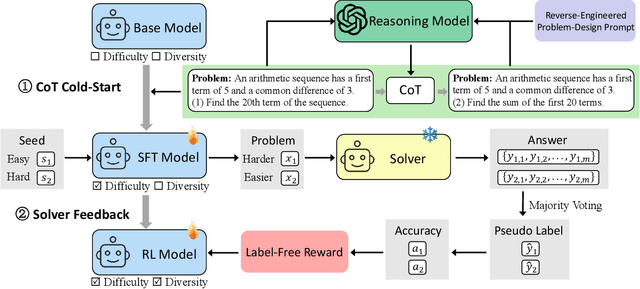
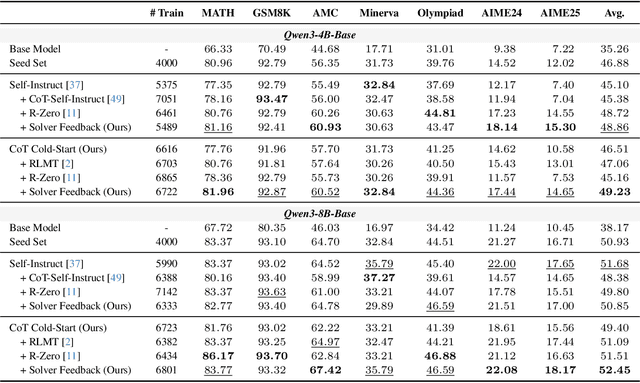
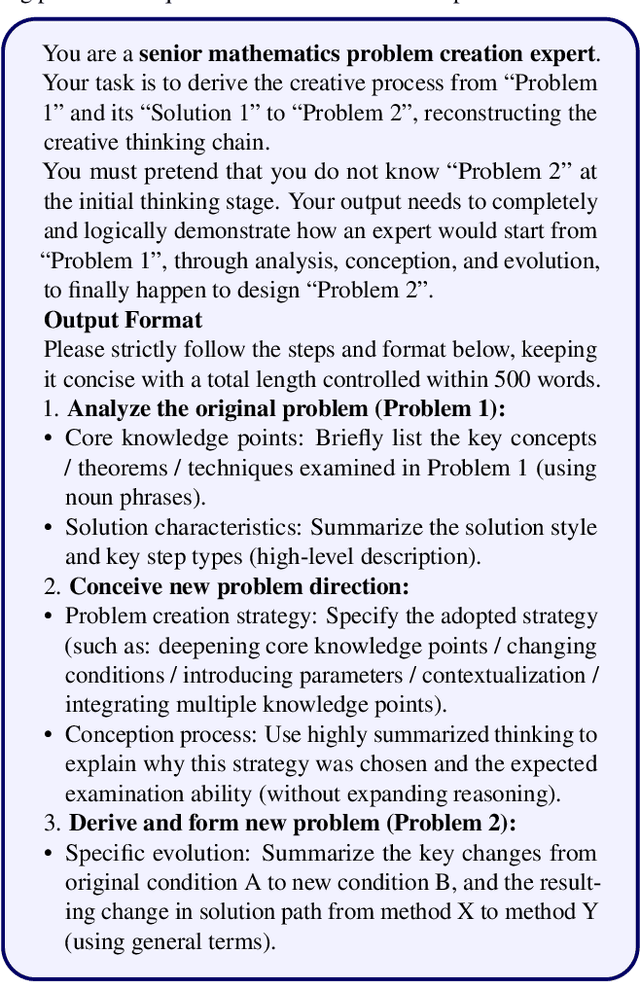
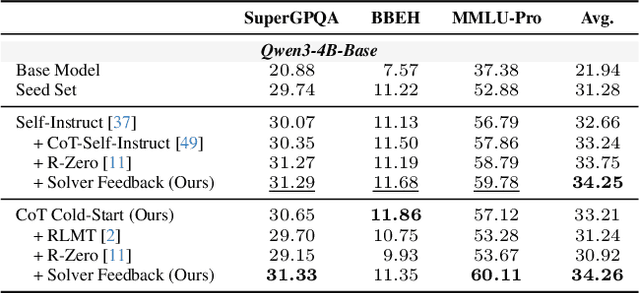
Abstract:Data synthesis for training large reasoning models offers a scalable alternative to limited, human-curated datasets, enabling the creation of high-quality data. However, existing approaches face several challenges: (i) indiscriminate generation that ignores the solver's ability and yields low-value problems, or reliance on complex data pipelines to balance problem difficulty; and (ii) a lack of reasoning in problem generation, leading to shallow problem variants. In this paper, we develop a problem generator that reasons explicitly to plan problem directions before synthesis and adapts difficulty to the solver's ability. Specifically, we construct related problem pairs and augment them with intermediate problem-design CoT produced by a reasoning model. These data bootstrap problem-design strategies from the generator. Then, we treat the solver's feedback on synthetic problems as a reward signal, enabling the generator to calibrate difficulty and produce complementary problems near the edge of the solver's competence. Extensive experiments on 10 mathematical and general reasoning benchmarks show that our method achieves an average improvement of 2.5% and generalizes to both language and vision-language models. Moreover, a solver trained on the synthesized data provides improved rewards for continued generator training, enabling co-evolution and yielding a further 0.7% performance gain. Our code will be made publicly available here.
Towards Implicit Aggregation: Robust Image Representation for Place Recognition in the Transformer Era
Nov 08, 2025Abstract:Visual place recognition (VPR) is typically regarded as a specific image retrieval task, whose core lies in representing images as global descriptors. Over the past decade, dominant VPR methods (e.g., NetVLAD) have followed a paradigm that first extracts the patch features/tokens of the input image using a backbone, and then aggregates these patch features into a global descriptor via an aggregator. This backbone-plus-aggregator paradigm has achieved overwhelming dominance in the CNN era and remains widely used in transformer-based models. In this paper, however, we argue that a dedicated aggregator is not necessary in the transformer era, that is, we can obtain robust global descriptors only with the backbone. Specifically, we introduce some learnable aggregation tokens, which are prepended to the patch tokens before a particular transformer block. All these tokens will be jointly processed and interact globally via the intrinsic self-attention mechanism, implicitly aggregating useful information within the patch tokens to the aggregation tokens. Finally, we only take these aggregation tokens from the last output tokens and concatenate them as the global representation. Although implicit aggregation can provide robust global descriptors in an extremely simple manner, where and how to insert additional tokens, as well as the initialization of tokens, remains an open issue worthy of further exploration. To this end, we also propose the optimal token insertion strategy and token initialization method derived from empirical studies. Experimental results show that our method outperforms state-of-the-art methods on several VPR datasets with higher efficiency and ranks 1st on the MSLS challenge leaderboard. The code is available at https://github.com/lu-feng/image.
Sparse Model Inversion: Efficient Inversion of Vision Transformers for Data-Free Applications
Oct 31, 2025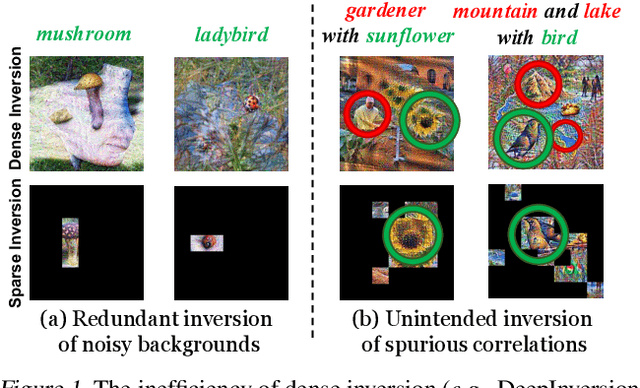

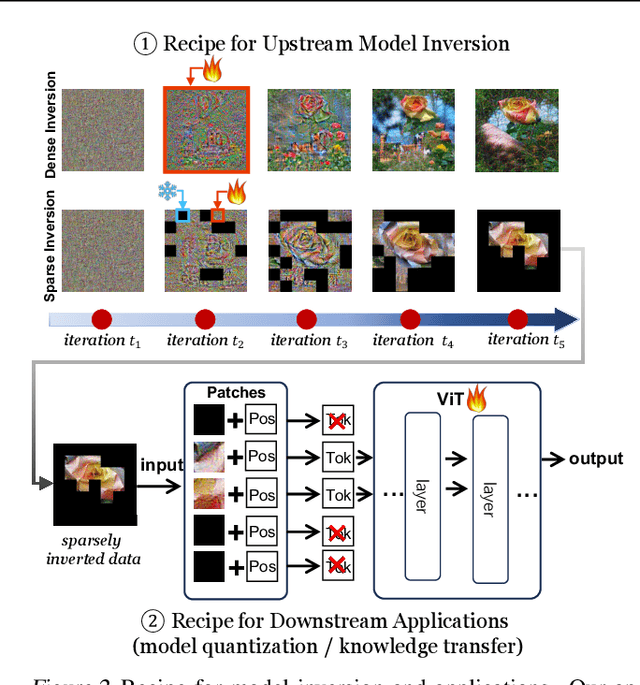
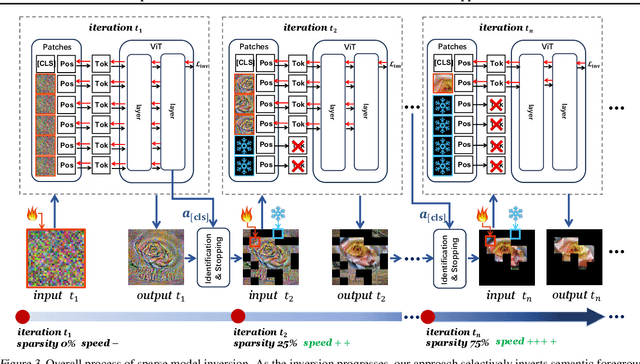
Abstract:Model inversion, which aims to reconstruct the original training data from pre-trained discriminative models, is especially useful when the original training data is unavailable due to privacy, usage rights, or size constraints. However, existing dense inversion methods attempt to reconstruct the entire image area, making them extremely inefficient when inverting high-resolution images from large-scale Vision Transformers (ViTs). We further identify two underlying causes of this inefficiency: the redundant inversion of noisy backgrounds and the unintended inversion of spurious correlations--a phenomenon we term "hallucination" in model inversion. To address these limitations, we propose a novel sparse model inversion strategy, as a plug-and-play extension to speed up existing dense inversion methods with no need for modifying their original loss functions. Specifically, we selectively invert semantic foregrounds while stopping the inversion of noisy backgrounds and potential spurious correlations. Through both theoretical and empirical studies, we validate the efficacy of our approach in achieving significant inversion acceleration (up to 3.79 faster) while maintaining comparable or even enhanced downstream performance in data-free model quantization and data-free knowledge transfer. Code is available at https://github.com/Egg-Hu/SMI.
FlashVSR: Towards Real-Time Diffusion-Based Streaming Video Super-Resolution
Oct 14, 2025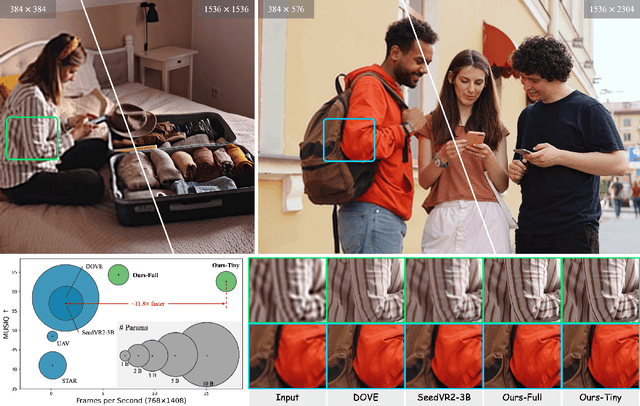
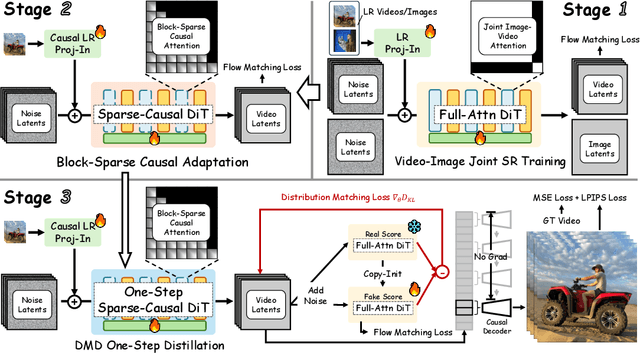
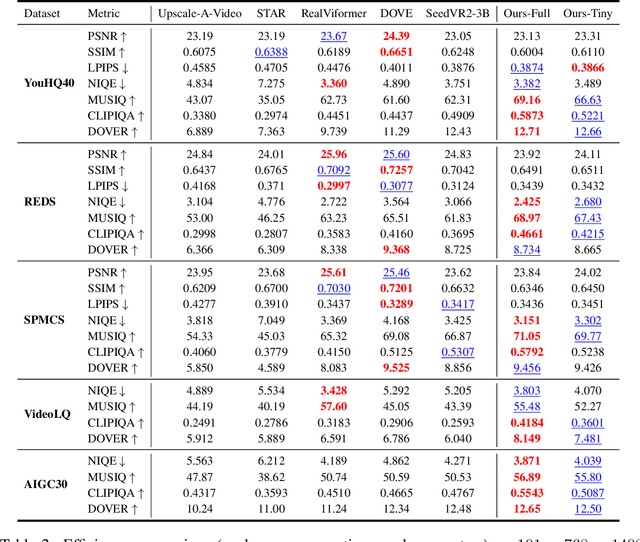
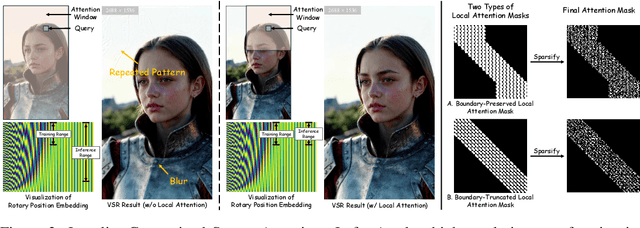
Abstract:Diffusion models have recently advanced video restoration, but applying them to real-world video super-resolution (VSR) remains challenging due to high latency, prohibitive computation, and poor generalization to ultra-high resolutions. Our goal in this work is to make diffusion-based VSR practical by achieving efficiency, scalability, and real-time performance. To this end, we propose FlashVSR, the first diffusion-based one-step streaming framework towards real-time VSR. FlashVSR runs at approximately 17 FPS for 768x1408 videos on a single A100 GPU by combining three complementary innovations: (i) a train-friendly three-stage distillation pipeline that enables streaming super-resolution, (ii) locality-constrained sparse attention that cuts redundant computation while bridging the train-test resolution gap, and (iii) a tiny conditional decoder that accelerates reconstruction without sacrificing quality. To support large-scale training, we also construct VSR-120K, a new dataset with 120k videos and 180k images. Extensive experiments show that FlashVSR scales reliably to ultra-high resolutions and achieves state-of-the-art performance with up to 12x speedup over prior one-step diffusion VSR models. We will release the code, pretrained models, and dataset to foster future research in efficient diffusion-based VSR.
Unified and Semantically Grounded Domain Adaptation for Medical Image Segmentation
Aug 12, 2025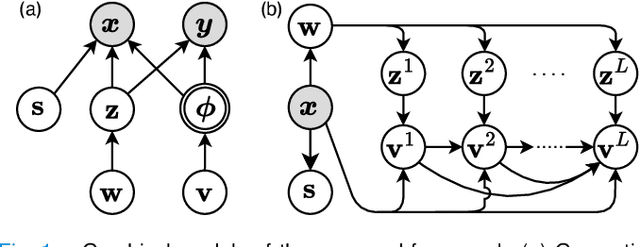
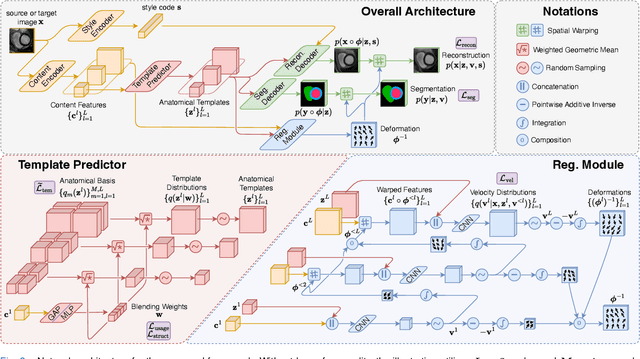
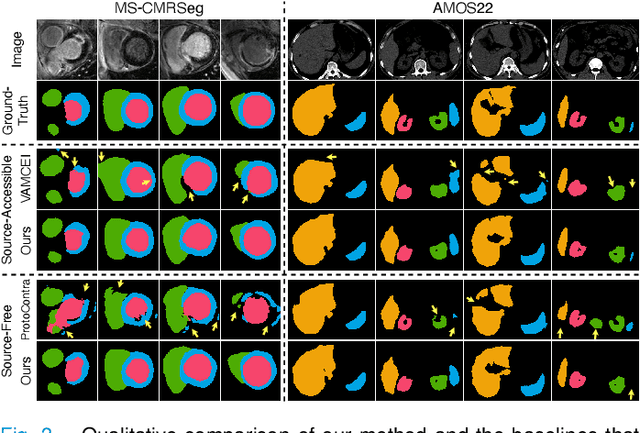
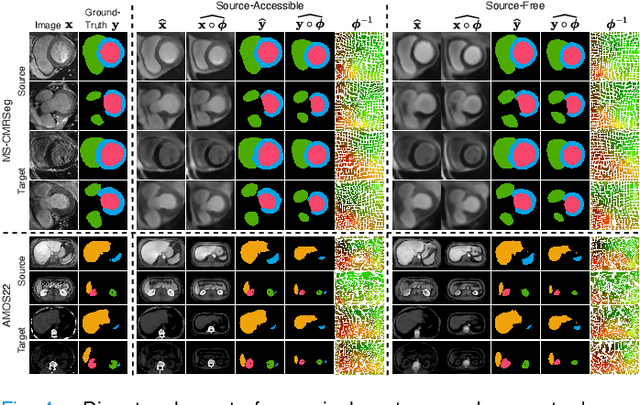
Abstract:Most prior unsupervised domain adaptation approaches for medical image segmentation are narrowly tailored to either the source-accessible setting, where adaptation is guided by source-target alignment, or the source-free setting, which typically resorts to implicit supervision mechanisms such as pseudo-labeling and model distillation. This substantial divergence in methodological designs between the two settings reveals an inherent flaw: the lack of an explicit, structured construction of anatomical knowledge that naturally generalizes across domains and settings. To bridge this longstanding divide, we introduce a unified, semantically grounded framework that supports both source-accessible and source-free adaptation. Fundamentally distinct from all prior works, our framework's adaptability emerges naturally as a direct consequence of the model architecture, without the need for any handcrafted adaptation strategies. Specifically, our model learns a domain-agnostic probabilistic manifold as a global space of anatomical regularities, mirroring how humans establish visual understanding. Thus, the structural content in each image can be interpreted as a canonical anatomy retrieved from the manifold and a spatial transformation capturing individual-specific geometry. This disentangled, interpretable formulation enables semantically meaningful prediction with intrinsic adaptability. Extensive experiments on challenging cardiac and abdominal datasets show that our framework achieves state-of-the-art results in both settings, with source-free performance closely approaching its source-accessible counterpart, a level of consistency rarely observed in prior works. Beyond quantitative improvement, we demonstrate strong interpretability of the proposed framework via manifold traversal for smooth shape manipulation.
Text-guided Visual Prompt DINO for Generic Segmentation
Aug 08, 2025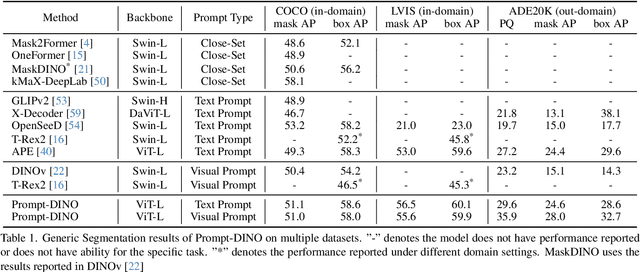
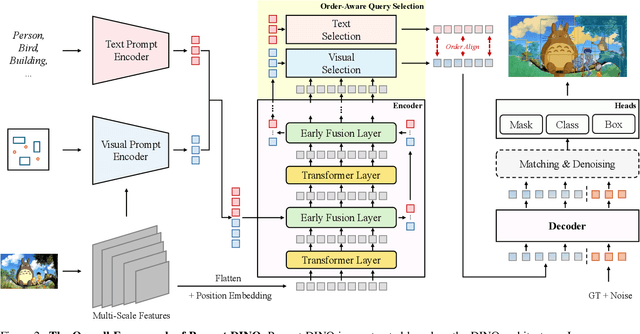
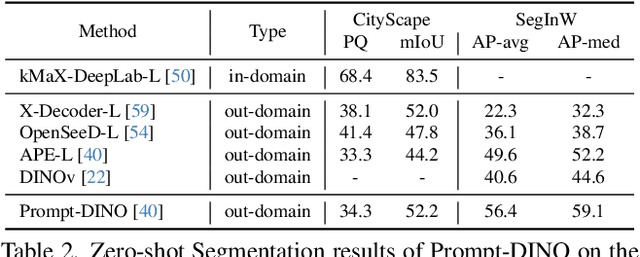
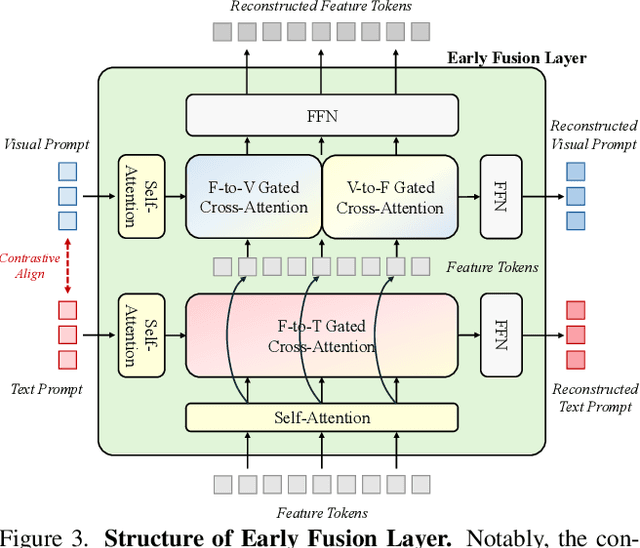
Abstract:Recent advancements in multimodal vision models have highlighted limitations in late-stage feature fusion and suboptimal query selection for hybrid prompts open-world segmentation, alongside constraints from caption-derived vocabularies. To address these challenges, we propose Prompt-DINO, a text-guided visual Prompt DINO framework featuring three key innovations. First, we introduce an early fusion mechanism that unifies text/visual prompts and backbone features at the initial encoding stage, enabling deeper cross-modal interactions to resolve semantic ambiguities. Second, we design order-aligned query selection for DETR-based architectures, explicitly optimizing the structural alignment between text and visual queries during decoding to enhance semantic-spatial consistency. Third, we develop a generative data engine powered by the Recognize Anything via Prompting (RAP) model, which synthesizes 0.5B diverse training instances through a dual-path cross-verification pipeline, reducing label noise by 80.5% compared to conventional approaches. Extensive experiments demonstrate that Prompt-DINO achieves state-of-the-art performance on open-world detection benchmarks while significantly expanding semantic coverage beyond fixed-vocabulary constraints. Our work establishes a new paradigm for scalable multimodal detection and data generation in open-world scenarios. Data&Code are available at https://github.com/WeChatCV/WeVisionOne.
UniGlyph: Unified Segmentation-Conditioned Diffusion for Precise Visual Text Synthesis
Jul 02, 2025Abstract:Text-to-image generation has greatly advanced content creation, yet accurately rendering visual text remains a key challenge due to blurred glyphs, semantic drift, and limited style control. Existing methods often rely on pre-rendered glyph images as conditions, but these struggle to retain original font styles and color cues, necessitating complex multi-branch designs that increase model overhead and reduce flexibility. To address these issues, we propose a segmentation-guided framework that uses pixel-level visual text masks -- rich in glyph shape, color, and spatial detail -- as unified conditional inputs. Our method introduces two core components: (1) a fine-tuned bilingual segmentation model for precise text mask extraction, and (2) a streamlined diffusion model augmented with adaptive glyph conditioning and a region-specific loss to preserve textual fidelity in both content and style. Our approach achieves state-of-the-art performance on the AnyText benchmark, significantly surpassing prior methods in both Chinese and English settings. To enable more rigorous evaluation, we also introduce two new benchmarks: GlyphMM-benchmark for testing layout and glyph consistency in complex typesetting, and MiniText-benchmark for assessing generation quality in small-scale text regions. Experimental results show that our model outperforms existing methods by a large margin in both scenarios, particularly excelling at small text rendering and complex layout preservation, validating its strong generalization and deployment readiness.
A Simple Linear Patch Revives Layer-Pruned Large Language Models
May 30, 2025
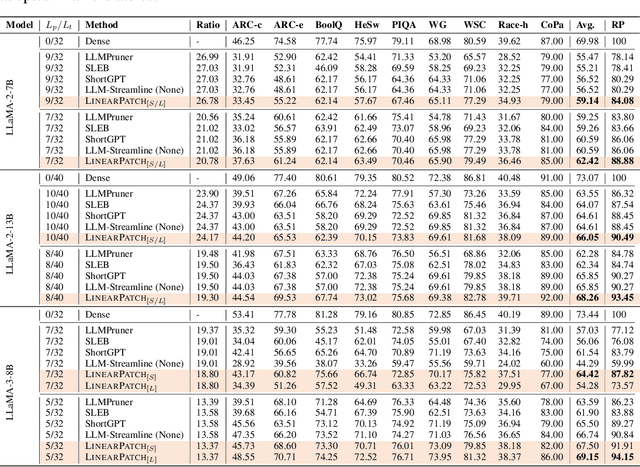


Abstract:Layer pruning has become a popular technique for compressing large language models (LLMs) due to its simplicity. However, existing layer pruning methods often suffer from significant performance drops. We identify that this degradation stems from the mismatch of activation magnitudes across layers and tokens at the pruning interface. To address this, we propose LinearPatch, a simple plug-and-play technique to revive the layer-pruned LLMs. The proposed method adopts Hadamard transformation to suppress massive outliers in particular tokens, and channel-wise scaling to align the activation magnitudes. These operations can be fused into a single matrix, which functions as a patch to bridge the pruning interface with negligible inference overhead. LinearPatch retains up to 94.15% performance of the original model when pruning 5 layers of LLaMA-3-8B on the question answering benchmark, surpassing existing state-of-the-art methods by 4%. In addition, the patch matrix can be further optimized with memory efficient offline knowledge distillation. With only 5K samples, the retained performance of LinearPatch can be further boosted to 95.16% within 30 minutes on a single computing card.
 Add to Chrome
Add to Chrome Add to Firefox
Add to Firefox Add to Edge
Add to Edge